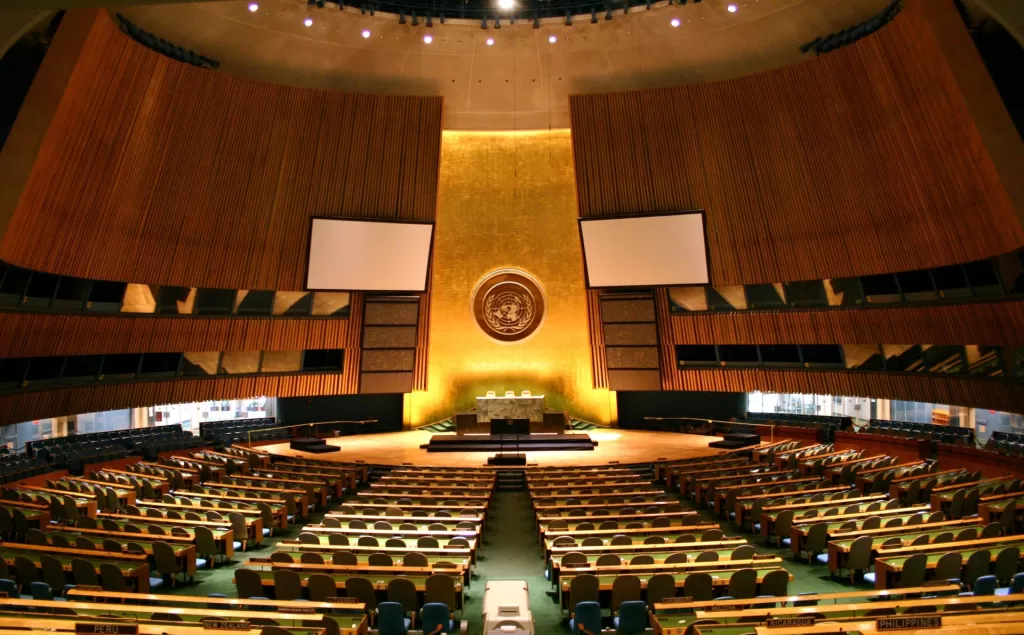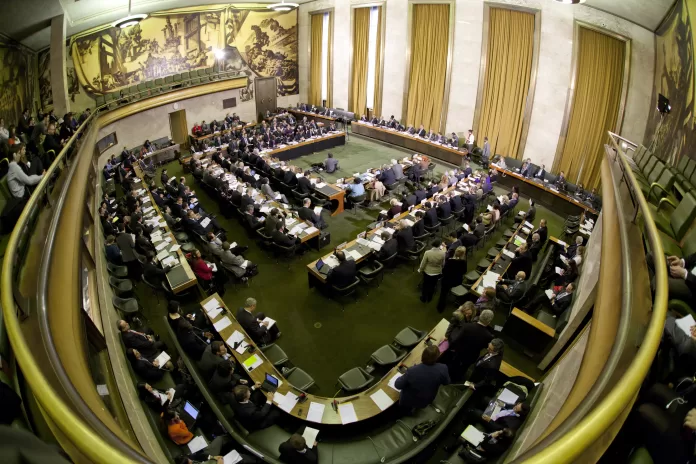The Conference on Disarmament (CD) is a multilateral forum for disarmament diplomacy. It has evolved important treaties banning biological and chemical weapons as well as underground nuclear tests. CD hasn’t produced anything worthwhile since the 1996 Comprehensive Test Ban treaty (CTBT), a pact now on hold because some key nations, including the US, have not yet ratified it. On the issue of fissile material CD could not evolve a consensus on a substantive work for last over 12 years. Earlier USA blocked the proceedings for about eight years, as Bush administration had opposed negotiating a fissile material cut off pact, arguing that it could not be verifiable because the inspection regime would be too intrusive, too expensive and yet unreliable.
First session of the CD for the current year began in Geneva on 24 January. Over the last few years, an aura has been created that Pakistan is the only country blocking the negotiations of a very noble international treaty related to non-proliferation of WMD’s and more specifically the nuclear weapons. Beyond skin deep examination of the matter reveals that the cut off based FMCT is neither a noble cause, nor would it contribute towards non-proliferation. It is driven by vested interests, and would perpetualize proliferation.
Due to structural limitations, CD has often been mired in deadlocks. Currently, there are 65 member states. Within the CD these members have identities like the Western Group, the Non-Aligned Movement or G 21, the Group of Eastern European States, the P5 etc. CD takes its decisions by consensus. Every member has the right of veto, and to halt the negotiations if it perceives that its national interests could be in jeopardy. So when Pakistan exercises its option of negative vote, it is not doing anything out of the blue, but is following the set procedure.
An agreement on fissile material management is held hostage to intricately intertwined Indian policies of nuclear security and power generation. To understand the real significance of the FMCT for Pakistan, one needs to dig deeper into India’s nuclear energy programme, rather than its nuclear security programme. India has piled up over 1600 tons of reactor grade fissile material. Reactor grade Plutonium was used in one of the Indian nuclear explosions of 1998.
Pakistan’s principal worry is India’s accumulation of reactor grade Plutonium for its fast breeder reactors (FBRs). Though most of the nuclear powers have abandoned the FBR technology, it continues to form the backbone of India’s overall plan for nuclear energy. Their number would increase by 5 times by 2020 and more than 60 times by 2050. So far, India has refused to accept any safeguards on its FBR programme.
India-US Agreement 123 of 2005 and the subsequent country specific waiver by the Nuclear Suppliers Group (NSG), granted in 2008, has triggered the survival instinct amongst the strategic planners of Pakistan. These two instruments facilitate India to manage its nuclear weapon programme without any external accountability. NSG waiver has enabled India to sign nuclear cooperation arrangements with a dozen or so countries, allowing it to import fissile material. Though imported fissile material would be used in civilian applications and would be duly accounted for; its practical implication would be that India will use its domestic stockpiles of fissile material for weapon production.
It is interesting to recall that the NSG was created in 1975 to standardize nuclear trade rules as a reaction to India’s testing of a nuclear explosive device in 1974. To carry out that explosion, India had clandestinely diverted Plutonium from a power reactor provided to it by Canada.
The form of treaty that is being proposed in the form of cut off of production of fissile material from an arbitrary future date would only freeze the existing strategic asymmetries that exist between the states. Pakistan is taking a holistic position by proposing a regime that besides banning the future production, should also take into account the existing stocks.
Unfortunately the cartel of countries which holds huge quantities of fissile material wants to continue holding it. Hence retaining the option of increasing their respective stockpile of nuclear weapons at will. This would give them the capability of vertical as well as horizontal proliferation of nuclear weapons. Banning the production of fissile material without first capping its weapon related applications would only encourage clandestine production, thus feeding the black market. This amounts to treating the symptoms while ignoring the root causes.

Pakistan has been an ardent supporter of all non-proliferation initiatives. It activity participated in the negotiations pertaining to NPT; but had to stay as a ‘Hold Out’ because of regional dynamics; later regional developments proved that Pakistan’s decision was the best option in its national interest. Likewise, Pakistan participated in the activities leading to conclusion of CTBT and voted in its favour at the UNGA. Once again, Pakistan’s non-signature and non-ratification of CTBT is because of regional security compulsions.
Principal security threat for Pakistan emanates from India, which is not a party to both these treaties. Pakistan’s nuclear programme is security driven, and it is a modest one. Pakistan does not plan to match a weapon-for-weapon with India; it only wants to maintain minimum credible deterrence, especially so in the context of dangerous doctrinal positions like ‘Cold Start Doctrine’, which is indeed a mindset. Though ‘Strategic Restraints Initiative’ is still on the cards, at bilateral level, threat has assumed a triangular contour since India declared China as its principal enemy. Having six nuclear weapons capable countries and a couple of threshold states, Asia needs to be treated as a single entity in terms of nuclear issues.
India with a historic record of blowing holes into global non-proliferation efforts stands rewarded; and Pakistan a proponent of non-proliferation is left high and dry. Fissile material management is a tricky issue; much more than managing the number of warheads and missiles. There are a number of loopholes which could be exploited for circumventing a cut off centric treaty.
A viable course of action would be a drastic reduction in nuclear warheads and other military applications of fissile material. Once the demand is reduced, the production would fall.
India is developing a Ballistic Missile Defence (BMD). America is also helping India in setting-up such systems. An effective BMD would warrant that Pakistan should have around three times its existing warheads to maintain its posture of minimum credible deterrence.
Pakistan’s position is neither the first, nor the only example of a country insisting in multilateral arms negotiations that its security interests be accommodated in a binding treaty. Arms control efforts over the previous decades always had to be flexible enough to address the security concerns of participating states. Effort towards CTBT started in 1954; end result has still not been achieved.
G-21 members have also been reiterating that the CD’s work should not become hostage to one issue, the FMCT, and should proceed on other disarmament matters as well, so that its work is on equal treatment of all issues. Moreover, envisaged treaty must take into account the security concerns of all states.
Pakistan believes that the treaty, as currently envisaged, will upset the strategic equilibrium in the subcontinent by limiting Pakistan’s deterrent capability, especially so when India has been provided the means to burst the ceiling of its nuclear arsenal; on as require basis.
Nuclear warheads and, as a corollary, stocking requirement of fissile material is prompted by the threat perception of a nation. Hence, as a prerequisite, there is a need to find fair and just solutions to potential hot spots, and then proceed for non proliferation. There is also a necessity to take into account regional imbalances in the domains of conventional weapons, ballistic missile threat and militarization of outer space etc.
Accommodating Pakistan’s strategic concerns and those of other developing nations in the CD provides the best and the only way forward if fissile material management regime is to be pursued on the basis of the principle of equal security for all. Where hard security compulsions are involved, nations must neither be isolated nor coerced.




